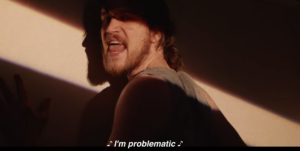
Screenshot from Bo Burnham’s recent Netflix special, ‘Inside.’
Comedian-musician Bo Burnham has a song in his most recent Netflix special, Inside, that admits he is “problematic.” In making a joke of something true, he either faces it or is trying to get ahead of criticism (or both), depending on the viewing.
Burnham has been performing online since he was 16 years old, and some of his early songs—as well as more recent ones—are written with lines designed to be crass or offensive. An early comedy-club set shows him performing a persona song called “What’s Funny?” in which his character rails against women and slams the keys of his piano violently, followed by “Oh Bo,” a piano-rap that might manage to be offensive to women in general, Hispanic women in particular, rappers, gay men, those with Down syndrome, the obese—and Oprah. One line involves fellatio and African starvation.
The material is no worse than other rap or standup comedy sets, and Burnham’s response has largely been that his early work is what allowed him to mature, and that he is grateful for having been allowed to make mistakes; he has pulled up short of apology, saying it might have been “a little homophobic, a little racially insensitive.” He says he is “happy to be an example of someone that failed out loud publicly, in a certain way, and was hopefully able to evolve and get past that.”
But his rising visibility, in our easily-offended time, sets up an interesting dynamic, particularly since his satirical bent (based in real anger, it seems) has deepened, and some of his fan base might find themselves targets. While some defend his work as art, or say he is dismantling the very attitudes he is portraying, or excuse him as depressed (and therefore somehow immune to criticism) or vulnerable or cute, others have begun to bristle. (Aging might be affecting that. He has passed 30, after all.)
I lurk on several fan groups to see what they make of Inside, which I thought was smart. Recently a fracas broke out over Burnham’s Inside song “White Woman’s Instagram.” Most of the song is a list of visual clichés, representations of shallow spirituality, and easy virtue signaling. The “white woman,” played by Burnham in the video, is self-infantilizing yet sexualized, clueless, and filled with performative joy.
One fan wrote on Reddit: “I love this song. I love how it starts out as funny and gently mocking the stereotypical white woman Instagram account, then shifts our perception when opening up about mom’s death and how the woman has moved ahead with her life. It reframes the rest of the song as the triumph of living a full life after great loss, while still allowing it to be silly and gently making fun of those things. Suddenly it doesn’t feel just like shallow attention seeking; it feels like the woman takes pleasure in living her life (and eating avocado toast) and her joy and happiness is a gift to her mother.”
After getting what-for from others who saw all of it as criticism of a privileged and vapid worldview, the original poster wrote: “Edit: Gee, thanks for the snark, mean-spirited responses! No, I didn’t ‘miss the point.’ It’s open for interpretation. Clearly, sometimes interpretations differ. BTW, I totally get that we’re all nameless strangers on the internet. But please keep in mind that I am also a person. If you wouldn’t say it to my face, don’t say it to me here.”
Viewers began to draw battle lines over whether Burnham was a misogynist for satirizing a young woman at all, though the material is about as edgy as a Saturday Night Live skit. One fan said she had gone “all mama bear” on his critics for that; another lovingly called him “a giant twink” (he is six-foot five and has made jokes about being mistaken for gay), as if he could not intend real offense, or be serious enough to hope to criticize a kind of white, fourth-wave feminism that values individual gratification as empowerment, within an existing social system deeply rooted in exploitation.
